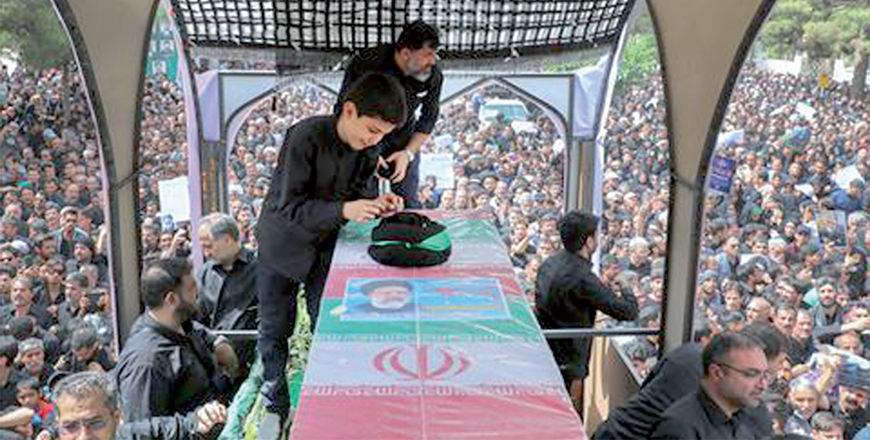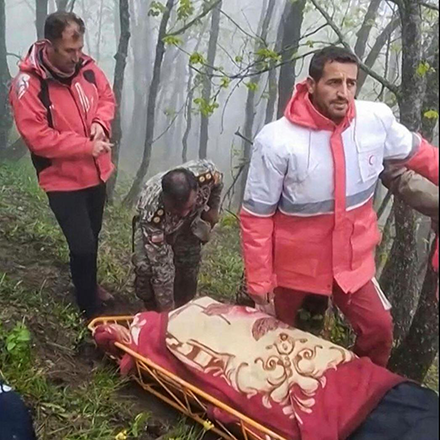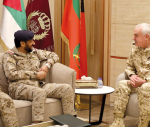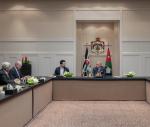You are here
Iranians pay last respects to president killed in helicopter crash
By AFP - May 22,2024 - Last updated at May 22,2024
TEHRAN — Tens of thousands of Iranians gathered on Tuesday to mourn president Ebrahim Raisi and seven members of his entourage who were killed in a helicopter crash on a fog-shrouded mountainside.
Waving Iranian flags and portraits of the late president, mourners set off from a central square in the north-western city of Tabriz, where Raisi was headed when his helicopter crashed on Sunday.
They walked behind a lorry carrying the coffins of Raisi and those who died with him, who also included foreign minister Hossein Amir-Abdollahian.
"We, the members of the government, who had the honour to serve this beloved president, the hardworking president, pledge to our dear people and leader to follow the path of these martyrs," Interior Minister Ahmad Vahidi said in a speech.
The helicopter lost communications while it was on its way back to Tabriz after Raisi attended the inauguration of a joint dam project on the Aras river, which forms part of the border with Azerbaijan, in a ceremony with his counterpart Ilham Aliyev.
A massive search and rescue operation was launched on Sunday when two other helicopters flying alongside Raisi's lost contact with his aircraft in bad weather.
State television announced his death in a report early on Monday, saying "the servant of the Iranian nation, Ayatollah Ebrahim Raisi, has achieved the highest level of martyrdom", showing pictures of him as a voice recited the Koran.
Killed alongside the president and the foreign minister were provincial officials and members of his security team.
Iran's armed forces chief of staff Mohammad Bagheri ordered an investigation into the cause of the crash as Iranians in cities nationwide gathered to mourn Raisi and his entourage.
Tens of thousands gathered in the capital's Valiasr Square on Monday.
National mourning
On Tuesday, the Assembly of Experts, a key clerical body in charge of selecting or dismissing Iran's supreme leader, held its opening session after its March election, with the seat reserved for Raisi carrying his portrait.
Raisi, who was widely expected to succeed current supreme leader Ayatollah Ali Khamenei, had been a member of the body since 2006.
Khamenei, who wields ultimate authority in Iran, declared five days of national mourning and assigned vice president Mohammad Mokhber, 68, as caretaker president until a presidential election can be held.
State media later announced that the election will be held on June 28.
Iran's top nuclear negotiator Ali Bagheri, who served as deputy to Amir-Abdollahian, was named acting foreign minister.
From Tabriz, Raisi's body will be flown to the Shiite clerical centre of Qom later Tuesday before being moved to Tehran during the evening.
Processions will be held in the capital on Wednesday morning before Khamenei leads prayers at a farewell ceremony.
Raisi’s body will then be flown to his home city of Mashhad, in the northeast, where he will be buried on Thursday evening after funeral rites.
Raisi, 63, had been president since 2021. The ultra-conservative’s time in office saw mass protests, a deepening economic crisis and unprecedented armed exchanges with arch-enemy Israel.
Raisi succeeded the moderate Hassan Rouhani, at a time when the economy was battered by US sanctions imposed over Iran’s nuclear activities.
Condolence messages flooded in from Iran’s allies around the region, including the Syrian government, Palestinian group Hamas and Lebanese group Hezbollah.
It was an unprecedented Hamas attack on Israel that sparked the devastating war in Gaza, now in its eighth month, and soaring tensions between Israel and the “resistance axis” led by Iran.
Israel’s killing of seven Revolutionary Guards in a drone strike on the Iranian consulate in Damascus on April 1 triggered Iran’s first ever direct attack on Israel, involving hundreds of missiles and drones.
In a speech hours before his death, Raisi underlined Iran’s support for the Palestinians, a centrepiece of its foreign policy since the 1979 Islamic revolution.
Palestinian flags were raised alongside Iranian flags at ceremonies held for the late president.
Related Articles
TEHRAN — Iranian president Ebrahim Raisi was laid to rest on Thursday, concluding days of funeral rites attended by throngs of mourners afte
AMMAN — Deputy Prime Minister and Foreign Minister Ayman Safadi on Monday telephoned Iran's acting Foreign Minister Ali Bagheri Kani and con
TEHRAN — Iran's first vice president, Mohammad Mokhber, is expected assume the presidency after Ebrahim Raisi's death in a helicopter crash

















